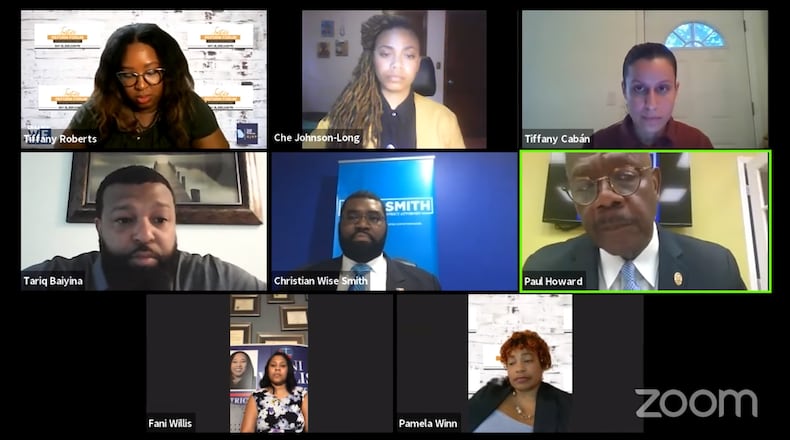Fulton County District Attorney Paul Howard, one of the state’s most aggressive prosecutors in seeking the death penalty, has said he will no longer ask for the ultimate punishment.
Howard made the pledge Tuesday during a candidate forum hosted by the Georgia Justice Reform Partnership. He responded yes to a question by a moderator, who asked, “Will you commit to refuse to seek the death penalty?”
Howard, who is running for reelection in the June 9 primary, is being challenged by Atlanta lawyers Christian Wise Smith and Fani Willis. At the same forum, Smith and Willis also said they would not seek the death penalty, which means there should be no new capital cases in Georgia's most populous county for the foreseeable future.
“I believe Georgia should lead the nation in coming to grips with a criminal sentence that might have outlived its usefulness,” Howard told The Atlanta Journal-Constitution on Thursday.
Capital punishment is on the wane as more and more juries -- and prosecutors -- agree to sentences of life in prison without parole.
Only one Georgia jury has handed down a death sentence over the past six years. That occurred in April 2019 when a Gwinnett County jury sentenced Tiffany Moss to die by lethal injection for starving her 10-year-old stepdaughter to death, then trying to burn the child's corpse inside a trash can. In that case, Moss represented herself as her own lawyer and put up no defense.
Howard called for a three-phased approach. First, he said, Gov. Brian Kemp should appoint a commission that examines phasing out the death penalty and receives input from citizens across the state.
Phase Two would be a five-year to 10-year moratorium during which crime statistics are monitored to determine if the moratorium produced any negative effects, Howard said. The final phase would be the passage of a constitutional amendment to eliminate the death penalty for crimes not involving terrorism or the deaths of multiple children, he said.
Since 2005, Howard has filed notices to seek death in about 40 cases, according to state records. He obtained death sentences in just two of them, and a judge has since granted one a new sentencing trial.
There are now nine pending capital cases in Fulton. As for their dispositions, Howard said, he would consider them through a “case by case analysis.”
Jerry Word, who heads Georgia’s capital defender office, welcomed the news. “We look forward to working with District Attorney Howard to try and resolve those cases,” he said.
At Tuesday’s forum, Smith said he opposed the death penalty in his opening remarks, long before the candidates were asked about it.
“I have never agreed with the death penalty,” Smith said Thursday. “It’s inhumane. It’s expensive.”
Since the advent of DNA testing, dozens of inmates on death row have been cleared of their crimes, he added. “My concern is if you get a death penalty case wrong there’s no coming back.”
Smith said if elected, he will withdraw death notices in all pending cases.
Willis, a former chief deputy in the Fulton DA's office, said she has prosecuted hundreds of murders. "None of those cases I believed were appropriate for death," she said.
The one exception might be the case against Brian Nichols, who killed four people — a judge, a court reporter, a sheriff’s deputy and a federal agent — after escaping from custody while on trial for rape in March 2005, Willis said. But after the DA’s office spent millions of dollars prosecuting Nichols, his jury could not unanimously agree on a death sentence and he was sentenced to life without parole.
“I cannot foresee a case (in which) I would seek death, as I believe that life without parole is an appropriate remedy,” Willis said.
About the Author
Keep Reading
The Latest
Featured






